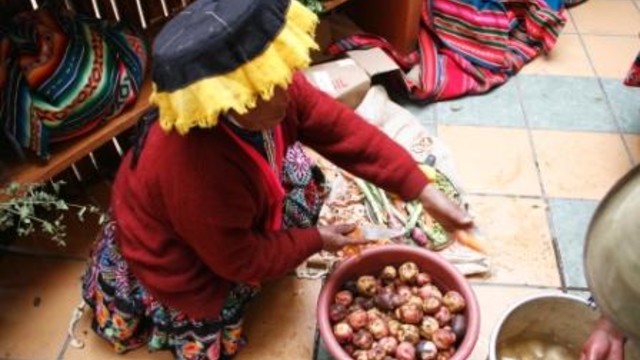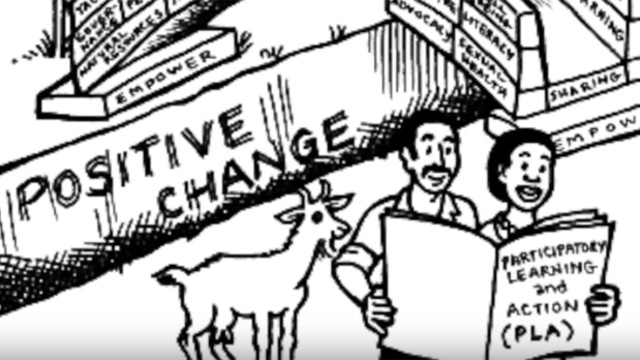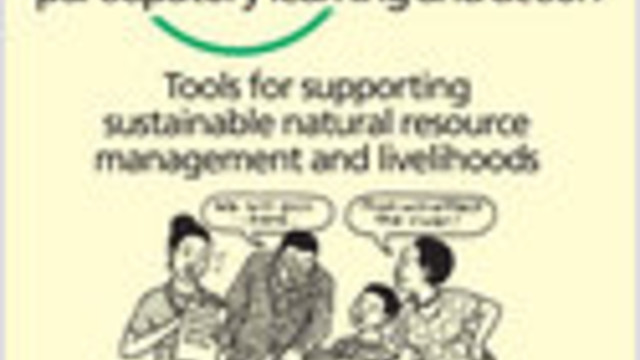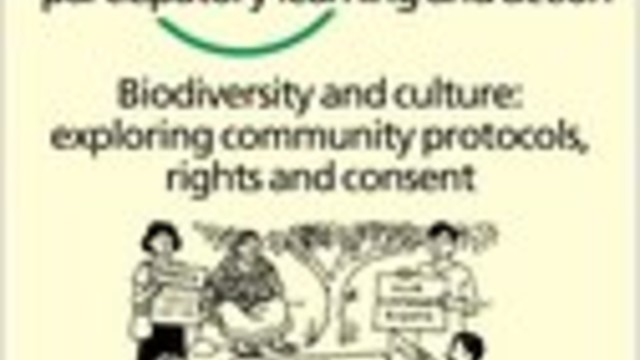PLA 54: Mapping for change: practice, technologies and communication
This edition of Participatory Learning and Action focuses on geo-spatial information management tools.
- Participatory Learning and Action: a journal for newcomers and experienced practitioners alike
- About PLA: Background, aims and history of the journal
- Explore the archive: browse and download issues or individual articles
IIED and CTA, April 2006
Guest editors: Giacomo Rambaldi, Jon Corbett, Mike McCall, Rachel Olson, Julius Muchemi, Peter Kwaku Kyem, Daniel Weiner, with Robert Chambers.
PGIS is an evolved form of community mapping, the result of a spontaneous merger of Participatory Learning and Action (PLA) methods with Geographic information Technologies and Systems (GIT&S).
If used appropriately, PGIS practice may have profound implications and stimulate innovation and social change. PGIS aims at placing control on access and use of culturally sensitive spatial data in the hands of those who generated the data thereby protecting traditional knowledge and wisdom from external exploitation.
The articles represent a considerable depth of experience, documenting established and cutting-edge tools and a selection of articles on theory and reflections from practice – including ethical considerations, potential pitfalls and other lessons learnt from experience.
PLA 54 is particularly timely as it highlights and documents a significant coming-of-age in PGIS practice, which over the last decade has grown into a networked and united community of practitioners.
This work is licensed under the Creative Commons Attribution-Non-Commercial-Share Alike 3.0 Unported License. Content can be freely reproduced for non-commercial purposes, provided the source is fully acknowledged.
Follow the links below to download the whole issue or individual articles in pdf format.
Supplementary multi-lingual CD-ROM
Contents
Theme section
Overview: Mapping for Change - the emergence of a new practice
by Jon Corbett, Giacomo Rambaldi, Peter Kyem, Dan Weiner, Rachel Olson, Julius Muchemi, Mike McCall and Robert Chambers.
Tool-based case studies
Using Community Information Systems to express traditional knowledge embedded in the landscape
by Jon Corbett and Peter Keller
Resource use, development planning, and safeguarding intangible cultural heritage: lessons from Fiji Islands
by Giacomo Rambaldi, Silika Tuivanuavou, Penina Namata, Paulo Vanualailai, Sukulu Rupeni, and Etika Rupeni
(NB the Fiji Island project was recently selected as one of the World Summit Award 2007 Winners in the Category e-Culture ).
Finding a common ground in multi-party land use conflicts using PGIS: lessons from Ghana
by Peter A. Kwaku Kyem
Is there life after tenure mapping?
by Peter Poole
Issue-based case studies
PGIS as a sustained (and sustainable?) practice: First Nation Experiences in Treaty 8 BC, Canada
Craig Candler, Rachel Olson, Steven DeRoy, and Kieran Broderick
A participatory approach to monitoring slum conditions: an example from Ethiopia
Tsion Lemma, Richard Sliuzas and Monika Kuffer
Capacity development and PGIS for land demarcation: innovations from Nicaragua
Sylvanie Jardinet
The power of maps: cartography with indigenous people in the Brazilian Amazon
by the inhabitants of Moikarako, Pascale de Robert, Jean-François Faure, and Anne-Elisabeth Laques
Land and natural resource mapping by San Communities and NGOs: experiences from Namibia
Julie Taylor and Carol Murphy with Simon Mayes, Elvis Mwilima, Nathaniel Nuulimba and Sandra Slater-Jones
Participatory GIS and local knowledge enhancement for community carbon forestry planning: an example from Cameroon
Peter A. Minang and Michael K. McCall
Theory and reflections from practice
Mapping projects: identifying obstacles, finding solutions
Mac Chapin
Mapping power: ironic effects of spatial information technology
Jefferson Fox, Krisnawati Suryanata, Peter Hershock and Albertus Hadi Pramono
Practical ethics for PGIS practitioners, facilitators, technology intermediaries and researchers
Giacomo Rambaldi, Robert Chambers, Mike McCall and Jefferson Fox.
Precision for whom? Mapping ambiguity and certainty in (participatory) GIS
Mike McCall
General Section
The world in a suitcase: psychosocial support using artwork with refugee children in South Africa
Glynis Clacherty
The role of local elites in development projects: an experience from Sudan
Dipankar Datta
Tips for trainers: the Snowball technique
Mike McCall, Holly Ashley and Giacomo Rambaldi
In Touch, including reviews of resources related to PGIS including book reviews and websites
Related resources
- ICT Update article: Mapping - a guide to good practice
- ICT Update issue 54 Mapping
- PLA 54: Multilingual CD Rom, July 2007
- Survey results: PLA 54 Mapping for Change - practice, technologies and communications (August 2006)
- Mapping for Change conference 2005 report back: a 13-minute reportage
- IAPAD - Participatory Avenues: the Gateway to Community Mapping, PGIS and PPGIS
- PPGIS.net: Open Forum on Participatory Geographic Information Systems and Technologies
Acknowledgements
The articles for this special issue were selected from papers presented at the Mapping for Change: International Conference of Spatial Information Management and Communication held in Nairobi, Kenya, 7th-10th September 2005. This special issue was supported by the following organisations:
- Centre for International Forestry Research (CIFOR)
- Technical Centre for Agricultural and Rural Cooperation (CTA)
- Environmental Research Mapping and Information Systems in Africa (ERMIS Africa)
- The Christensen Fund
- International Institute for Environment and Development (IIED)
- International Institute for Geo-Information Science and Earth Observation (ITC)
- Secretariat of the Pacific Community - EU/SPC Development of Sustainable Agriculture in the Pacific (DSAP) project
Multilingual CD-ROM
Participatory Learning and Action 54: Mapping for change: practice, technologies and communication.
IIED and CTA, July 2007
Price $40.00
The Participatory Mapping for Change CD-ROM is an exciting multi-lingual project in the Participatory Learning and Action series. Co-published by IIED and CTA, the CD-ROM contains PDF versions of the theme articles from Participatory Learning and Action 54: Mapping for change: practice, technologies and communication, in the following languages:
Arabic, Bangla, Chinese (traditional and simplified), English, French, Hindi, Persian-Dari, Portuguese, Spanish, Swahili, Tamil.
It also includes other key resources (mainly in English), such as DVD examples from practice, a glossary of terms, practical ethics for PGIS practitioners, the UNESCO Declaration on Cultural Diversity and related UNESCO Conventions, an overview of experiences from the International Land Coalition (ILC) network, links to other resources, video clips from the Mapping for change conference in Nairobi, the P3DM video, as well as past articles which appeared in PLA of relevance to the theme - all presented in an easy-to-use format.
Subscribers to the series will receive a free copy with PLA 56, as will all new subscribers. Copies are also available from our booksellers Earthprint Ltd, priced US$40 plus postage and packaging, or free to non-OECD customers.
The Participatory Mapping for Change CD-ROM has been supported by:
- Commission on Environmental, Economic and Social Policy (CEESP) of IUCN
- Center for Development Services (CDS)
- Centre for Sustainable Development (Cenesta)
- CTA - Technical Centre for Agricultural and Rural Cooperation ACP-EC
- Department for International Development, UK (DFID)
- GTZ - Deutsche Gesellschaft für Technische Zusammenarbeit GmbH
- Environmental Research, Mapping, and Information Systems in Africa
- First Peoples Worldwide (FPW)
- The Ford Foundation/Fundação Ford
- Indigenous Peoples of Africa Coordinating Committee (IPACC)
- International Institute for Environment and Development
- International Institute for Geo-Information Science and Earth Observation (ITC)
- The International Land Coalition
- PRA Promoters’ Society – Bangladesh
- Secretariat of the Pacific Community
- Society for People’s Education and Economic Change (SPEECH)
- UNESCO
We are grateful to all our partners for this support and to the Resource Centres for Participatory Learning and Action (RCPLA) and other colleagues for assisting us with the translation of articles.



